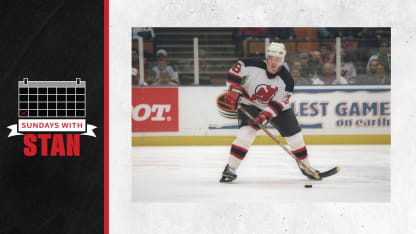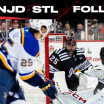The Trail of the Stanley Cup had reached East Rutherford.
Well, almost.
It was Friday, June 23, 1995 and Game 4 of the Stanley Cup Final was only one day away. The Devils were leading the Red Wings, three games to zero.
Call it impossible; call it what you will. In Detroit it was viewed as a hockey disaster.
Down the road from Byrne Arena in East Rutherford, a SportsChannel TV crew prepared for the next night's pre-game and post-game shows. There was a feeling of disbelief among them.
"I remember being in the (television) truck before our first playoff game in Boston," said tech man Dave Katz. "And we were worried whether the Devils even would win a game in the first round.
"And we also were scared about the team moving to Nashville. Somebody even said, 'Maybe to Hamilton, Ontario.' And look where we are now."
Reaching the Threshold | SUNDAYS WITH STAN
The Devils took a 5-2 lead in Game 4 of the 1995 Stanley Cup Final against Detroit as the clock wound down

sundays with stan
1995 Stanley Cup Final: Devils vs. Red Wings
To Sweep or Not to Sweep
Getting Closer to Stanley
Can They Beat Detroit Again?
The Decisive Game 1
Previewing the 1995 Final
The Nervous Hours Leading to Game 1
The Devils disposed of the Bruins, and then Pittsburgh and then Philadelphia. Now they sat just one victory away from deleting Hall of Fame coach Scotty Bowman's Red Wings.
Disbelief that New Jersey's only major professional team could capture hockey's supreme title had spread throughout the Garden State if not the United States and across the border to Canada.
Even into the visiting Detroit club's dressing room. The Motor City juggernaut now was reduced to naut; prompting Bowman to produce what he envisioned as an innovative strategy to avoid a sweep.
Scotty's opposite, Jacques Lemaire, had no plans to even tweak his winning lineup. "If it ain't broke," chortled one of the Devils assistant coaches, "no need to fix it."
"The lead up to the game," remembered broadcaster Mike (Doc) Emrick, "was the Devils usual carefulness. They knew what they had to do; and it likely wasn't going to be easy."
Actually, it was easier than anyone could have imagined in the opening minutes of the first period. While latecomers still were finding their seats, the Devils controlled the puck in the enemy zone.
Stephane Richer, a prolific Devil ever since his arrival from Montreal, arrived in the left corner with the puck and skimmed it to Neal Broten, who was camped near Detroit goalie Mike Vernon's left post.
The veteran of the 1980 Miracle On Ice, Broten had been acquired by Lou Lamoriello on Feb. 27, 1995. Not coincidentally, the Devils began winning big once Neal got rolling.
Now, just a minute after the fourth game had begun, Broten survived a check-from-behind by Detroit's Bob Errey and managed to squeeze the rubber under goalie Vernon's pads.
At only 1:08 of the first period, the Devils already owned a 1-0 lead. But the Visitors weren't dead yet. Exactly a minute later Sergei Federov tied the game on a rebound of his initial shot.
If the home crowd was a bit unnerved by that, Detroit's adroit defenseman Paul Coffey added to the crowd's frustration by beating Martin Brodeur - shorthanded, no less.
At 13:01 the Red Wings were ahead. One member of the SportsChannel crew, who was preparing for a post-game victory show, turned to another crew member and moaned, "I don't like the looks of things."
But, another of Lou's late-season acquisitions, defenseman Shawn Chambers, alleviated the widespread mental anguish that had permeated the vast arena.
Following a failed New Jersey power play, the Locals still managed to penetrate the Red Wings zone with both defensemen, Bruce Driver and Chambers involved.
The tying goal light was ignited by a play launched with a John MacLean pass to Driver. Spotting Chambers in shooting position, Driver hit him with a crisp pass.
Rich Chere of the Newark Star-Ledger described this turning point goal with these words:
"From the left point, Chambers walked in for a closer shot from inside the left circle. Chambers beat Vernon with a high shot on the goalie's far glove side."
The time was 17:45 and the Devils were restored to life. As the combatants trundled off the ice at the end of the first period, the score clock registered: Detroit 2, New Jersey 2.
"It's anyone's hockey game." That was the press row sentiment as the Red Wings appeared to have the Devils under control.
And so the score remained knotted at two in the second frame - until New Jersey's Bill Guerin hustled deep into the left side of the Red Wings zone.
Seizing the moment, the Devil fast-rising defenseman Scott Niedermayer left his post, skating deep to the left of the Detroit net.
"I saw Scotty closer to the net, so I took a chance and fed him the puck," Guerin recalled.
Nieder was off at a bad angle from the crease, but he spotted Broten in front of the net. Meanwhile, Red Wings defenseman Slava Fetisov fell to the ice, taking himself out of the play.
The pass from Niedemayer gave Broten room for a point-blank drive just 10 feet from Vernon.
"He made the save," said Broten, "but the puck came right back to me; so I took another crack at it and this time it went over him."
Vernon desperately - but futilely, as it happened - tried to get his mitt on the rubber but the attempt was too little, too late.
Still, with more than half a game left to play, the Devils only had a one-goal lead. Sticking strictly to coach Lemiaire's blueprint, the Garden Staters ably protected the lead up to the second intermission.
Doc Emrick: "Detroit was playing a different style and it was keeping them in the game. They were playing more carefully; almost replicating the Devils style."
But it still was New Jersey, 3-2, at the end of two. A Detroit goal in the third would make it a whole new ball game. If the home team scored and took a two-goal lead, that figured to be it for Bowman and his boys.
"The way I saw it," added Emrick, "the Devils had not only had the impetus of the crowd but an overwhelming ability to create turnovers and get goals."
And so it was evident in the third period. Spurred by a roaring crowd, the Devils laid siege to the Visitors zone, constantly owning the boards and eliminating Detroit clearing passes.
A cushion goal was Lemaire's aim as two of his rookies began dominating the Devils offense. Brian Rolston, who earlier in the season had been injured and dispatched to AHL Albany, extricated the puck along the right boards.
The other Albany product, baby-faced Russian, Sergei Brylin, eluded a Red Wings check outside the crease. Rolston's Hail Mary pass connected with Brylin's skate.
With a quick, yet subtle, whirling motion - as if he had been practicing the maneuver his whole life - Sergei simply moved the biscuit on to his stick and cleanly beat the beleaguered Vernon.
At 7:46 of the third period, Brylin had his first playoff goal and New Jersey was ahead, 4-2. The joyfully delirious audience simply could not stop cheering.
"Detroit is dead," one of the press box regulars shouted to the other typewriter pushers.
Incapable of containing his emotions, big enforcer Mike Peluso turned, weeping, to coach Lemaire and stunned him with these words: "I can't play another shift. It's bad enough I'm crying on the bench. I don't want to go out there and start crying on the ice."
An hour later - in the dressing room - Peluso would describe Brylin's effort as, "The biggest goal of the playoffs."
But the game was far from over. A two-goal lead is surmountable and the Red Wings were getting chances. One of them by defenseman Paul Coffey looked as if it was labelled, but Coffey shot wide.
Rich Chere: "The frustrated defenseman slammed his stick in disgust, realizing it was probably the turning point in the game."
Not that another goal was necessary to alter the ultimate decision but the crowd was demanding; and the home club would oblige on a power play.
The reeling Detroiters managed to block a Brylin-to-Chambers pass, and subsequent shot but the compact Russian retrieved the puck in the right corner.
Sergei's pass tunneled through a few legs and out to Chambers. With plenty of room to maneuver, the hulking defenseman took a few strides and wound up with the hardest slapper in his arsenal.
Vernon never had a chance. 5-2 Devils.
Up in the television booth, analyst John Davidson turned to Emrick and said: "Play this right, Doc, you're gonna remember it for a long time."

















